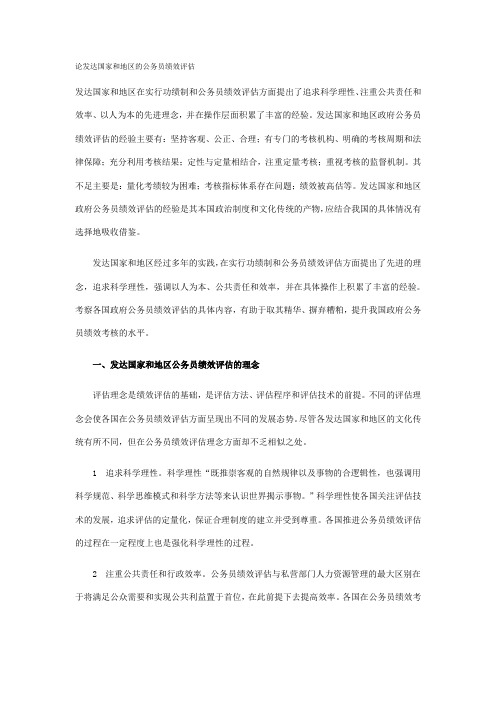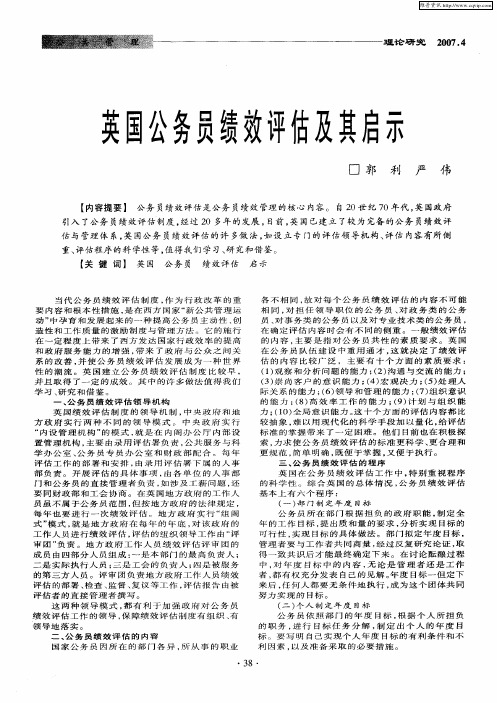英国政府现行公务员绩效评估制度概述
- 格式:pdf
- 大小:66.33 KB
- 文档页数:3

英国公务员绩效管理制度IntroductionThe civil service in the United Kingdom is one of the largest and most complex in the world, employing over 400,000 people across a wide range of professions and functions. As in any large organization, managing the performance of civil servants is a key priority for the government, as it ensures that the objectives of public service delivery are being met, and that taxpayers' money is being used effectively and efficiently.The performance management system for civil servants in the UK is designed to provide a framework for evaluating and improving the performance of individuals and teams, and to encourage and reward high performance. This system includes a range of tools and processes, such as performance appraisals, target setting, training and development, and rewards and recognition.In this essay, we will explore the key features of the performance management system for civil servants in the UK, and discuss its strengths and weaknesses, as well as any potential areas for improvement.Performance AppraisalsPerformance appraisals are a key component of the performance management system for civil servants in the UK. These are typically conducted on an annual basis, and involve a structured assessment of an individual's performance against a set of pre-defined objectives and competencies. The purpose of the appraisal is to provide feedback on performance, identify areas for improvement, and set targets for the coming year.Appraisals are usually conducted by the individual's line manager, who will assess their performance against a set of criteria, such as their ability to meet targets, their professional conduct, and their contribution to the team and the organization. The appraisal process also provides an opportunity for the individual to discuss their career aspirations and development needs with their manager.One of the key strengths of the performance appraisal system for civil servants in the UK is its focus on transparency and objectivity. Appraisals are based on clear and measurable criteria, and are conducted using a standardized process, which helps to ensure that performance evaluations are fair and consistent across the organization.Target SettingTarget setting is another important element of the performance management system for civil servants in the UK. Targets are typically set at the beginning of the year, and are designed to provide a clear and measurable focus for individuals and teams. These targets are linked to the organization's strategic priorities, and are used to drive performance and ensure that resources are being used effectively.Targets are usually set in consultation with the individual's line manager, and are designed to be challenging but achievable. Once targets have been set, progress against these targets is monitored throughout the year, and individuals are held to account for their performance.The target setting process is a key driver of performance in the civil service, as it provides a clear framework for individuals to work towards, and helps to ensure that everyone is aligned with the organization's goals. However, there has been criticism of the target setting process, with some arguing that it can lead to a focus on short-term results at the expense of longer-term strategic goals.Training and DevelopmentThe performance management system for civil servants in the UK also includes a focus on training and development. This is designed to ensure that individuals have the skills and knowledge they need to perform their roles effectively, and to support their career aspirations and development.Training and development opportunities are typically identified through the performance appraisal process, with individuals and their managers identifying areas for improvement and setting targets for development. These targets may include specific training courses or qualifications, as well as opportunities to gain new experiences and skills through secondments or job rotations.The UK civil service has a strong focus on investing in the development of its people, and there are a wide range of training and development opportunities available to civil servants. This helps to ensure that individuals have the skills they need to perform their roles, and supports the retention of talent within the organization.Rewards and RecognitionFinally, the performance management system for civil servants in the UK includes a focus on rewards and recognition. High performing individuals are typically rewarded through a range of mechanisms, such as performance-related pay, bonuses, and opportunities for promotion. There are also formal recognition schemes in place, which provide individuals with the opportunity to be recognized for their achievements.The focus on rewards and recognition is designed to incentivize high performance and to ensure that individuals feel valued for the contributions they make to the organization. However, there has been criticism of the current approach to rewards and recognition, with some arguing that it can lead to a focus on individual performance at the expense of collaborative working and team-based objectives.Strengths and WeaknessesOverall, the performance management system for civil servants in the UK has a number of strengths, including its focus on transparency and objectivity, and its investment in training and development. However, there are also a number of weaknesses, such as the potentialfor the target setting process to drive short-termism, and the limitations of the current approach to rewards and recognition.In order to address these weaknesses and build on the strengths of the current system, there are a number of potential areas for improvement. These could include a greater emphasis on collaborative working and team-based objectives, a review of the target setting process to ensure it supports longer-term strategic goals, and a refocus on rewards and recognition to ensure they reflect the values and behaviours the organization wants to promote.ConclusionIn conclusion, the performance management system for civil servants in the UK plays a key role in ensuring that the objectives of public service delivery are being met, and that taxpayers' money is being used effectively and efficiently. While the current system has a number of strengths, there are also areas for improvement, and the government should consider how it can evolve and adapt to meet the changing needs of the civil service and the wider public sector. By addressing these areas for improvement, the performance management system can continue to drive high performance and support the delivery of public services in the UK.。

论发达国家和地区的公务员绩效评估发达国家和地区在实行功绩制和公务员绩效评估方面提出了追求科学理性、注重公共责任和效率、以人为本的先进理念,并在操作层面积累了丰富的经验。
发达国家和地区政府公务员绩效评估的经验主要有:坚持客观、公正、合理;有专门的考核机构、明确的考核周期和法律保障;充分利用考核结果;定性与定量相结合,注重定量考核;重视考核的监督机制。
其不足主要是:量化考绩较为困难;考核指标体系存在问题;绩效被高估等。
发达国家和地区政府公务员绩效评估的经验是其本国政治制度和文化传统的产物,应结合我国的具体情况有选择地吸收借鉴。
发达国家和地区经过多年的实践,在实行功绩制和公务员绩效评估方面提出了先进的理念,追求科学理性,强调以人为本、公共责任和效率,并在具体操作上积累了丰富的经验。
考察各国政府公务员绩效评估的具体内容,有助于取其精华、摒弃糟粕,提升我国政府公务员绩效考核的水平。
一、发达国家和地区公务员绩效评估的理念评估理念是绩效评估的基础,是评估方法、评估程序和评估技术的前提。
不同的评估理念会使各国在公务员绩效评估方面呈现出不同的发展态势。
尽管各发达国家和地区的文化传统有所不同,但在公务员绩效评估理念方面却不乏相似之处。
1 追求科学理性。
科学理性“既推崇客观的自然规律以及事物的合逻辑性,也强调用科学规范、科学思维模式和科学方法等来认识世界揭示事物。
”科学理性使各国关注评估技术的发展,追求评估的定量化,保证合理制度的建立并受到尊重。
各国推进公务员绩效评估的过程在一定程度上也是强化科学理性的过程。
2 注重公共责任和行政效率。
公务员绩效评估与私营部门人力资源管理的最大区别在于将满足公众需要和实现公共利益置于首位,在此前提下去提高效率。
各国在公务员绩效考核过程中,一方面强调公务员的实际工作能力,保证行政组织的高效运转;另一方面强调公务员绩效考核中的公众参与,考察公务员能否承担起为公众服务的责任,实现公共利益。


英国高级公务员薪酬管理制度改革的最新进展英国高级公务员薪酬管理制度改革的最新进展—EMBA论文本文介绍了从2002年4月英国开始实施的高级公务员薪酬管理制度。
该制度的主要内容包括薪级与薪级内薪酬档次的划分,以及与绩效挂钩的薪酬增加评估方法。
文章最后对该薪酬管理制度作了简要的评价,探讨了英国公共行政改革的市场化取向及其发展趋势。
自1996年以来,英国中央政府在公务员管理体制方面实施了一系列的改革措施,对一般公务员和高级公务员开始采取分别管理:大部分管理一般公务员的权限下放给政府各部门和地方政府,中央政府不再进行统一管理和控制;高级公务员(常务次官、次官、副次官、主管职务和助理次官等约3 000多人)由中央政府统一管理。
英国高级公务员管理制度主要具有以下几个特点:(1)高级公务员在原来1~5级的公务员队伍中产生,他们是英国政府的高级管理人员、专家和政策咨询家,属于公务员的精英群体;(2)高级公务员单独与所在部门签订正式的聘用合同;(3)高级公务员由中央政府集中录用与培养;(4)高级公务员的薪酬根据其所任职务的工作量和工作绩效来确定;(5)高级公务员主要履行领导职能,须根据上级要求在政府各个部保持门之间轮换岗位.英国中央政府希望通过这样一套独立的管理体系来管理高级公务员,队伍的相对稳定,并通过高级公务员在各部门间的轮岗来增加部门间有效的沟通与交流,促进各部门间的横向协作.独立的高级公务员薪酬管理制度,主要包括薪级与薪级内薪酬档次的划分,以及与绩效挂钩的增加薪酬的评估方法。
中央政府通过设置薪级“上限”,规定薪级内薪酬档次划分标准以及年薪酬增长率来实现对各部门薪酬管理的统一控制.每年高级公务员薪酬评估机构(Senior Salaries Review Body,以下简称SSRB)对薪级与薪酬档次划分标准以及薪酬增长率以报告形式提出建议,中央政府根据每年新情况对SSRB的建议加以确认或修正,然后颁布实施。
薪酬管理制度改革的内容2002年4月之前,英国高级公务员长期实行9级制薪酬制度。

英国现行公务员绩效评估制度概述英国是实行公务员制度较早的国家,它自1855年成立公务员事务委员会以来,逐步建立了公务员考试录用、晋升考核、调整工薪、职业培训、奖励惩处、辞职辞退、退休养老等制度,1991年枢密院又通过了《公务员法令》,成为规范全国公务员的行为准则。
在二十世界的70年代,英国政府又建立了公务员绩效评估制度,进一步完善了国家公务员的法律体系。
英国公务员管理的法律建设情况,我国有关部门及专家学者,曾多次组团赴英进行考察,通过书刊等形式积累了许多这方面的情况和资料。
但对英国公务员绩效评估制度,缺乏深入细致的专题考察,也没有注意收集有关这一制度的详细资料。
为了更好地借鉴国外对公务员评估的有益做法,完善我国公务员的考核制度,改进公务员队伍的考评工作,我们以公务员绩效评估为核心内容,赴英国进行培训考察。
现将英国公务员绩效评估制度的概况综述如下:(一)领导公务员绩效评估的机构从英国执行公务员绩效评估制度的实践可以看出,只要有得力的领导机构去组织实施,制度规定就能落到实处,发挥其应有的法律效力;如果没有专门人同负责组织落实,制度所规定的内容就会流于形式,达不到预期的目的。
英国公务员绩效评估制度,所以能取得比较明显的效果,关键在于有专门的评估领导机构,负责该项制度的组织实施。
英国绩效评估制度的领导机制,中央政府和地方政府实行两种不同的领导模式。
中央政府实行“内设管理机构”的模式,就是在内阁办公厅内部设置管理机构,主要由录用评估署负责,公共服务与科学办公室、公务员专员办公室和财政部配合。
每年评估工作的部署和安排,由录用评估署下属的人事部负责。
开展评估的具体事项,由各单位的人事部门和公务员的直接管理者负责,如涉及工薪问题,还要同财政部和工会协商。
在英国地方政府的工作人员虽不属于公务员范围,但按地方政府的法律规定,每年也要进行一次绩效评估。
地方政府实行“组阁式”模式,就是地方政府在每年的年底,对该政府的工作人员进行绩效评估,评估的组织领导工作由“评审团”负责。

英国的政府绩效管理体制和几点启示廖昆明当前的政府绩效管理体制、绩效评估的指标体系、绩效评估对改善地方政府服务质量与管理水平的作用以及评估结果对中央政府与地方政府关系的影响。
文章最后阐述了对我国政府绩效管理和评估的几点有益的启示。
关键词:英国、中央政府、地方政府、绩效、管理、考核、评估、审计、监察、指标、最优价值、CPA、BVPIs、PSA。
人们通常认为,法国是西方国家中央集权行政制度的典型。
但实际上,英国中央集权的程度比法国有过之而无不及。
这一点集中体现在英国中央政府对地方政府独特的绩效管理体制上。
英国中央政府对地方政府的绩效管理经历了长期的历史发展,目前已经形成了一套完整而严密的体系。
这个体系目前主要由两部分组成:“最优价值绩效指标”(BVPIs)1体系和“全面绩效评估”(CPA)2体系。
一、英国政府绩效管理体制的历史发展十九世纪中叶以前,英国中央政府和地方政府的关系是以政治、司法监督和审计三种传统的责任机制为基础的。
但这种监控的责任机制基本上是地方性的。
十九世纪中叶的改革运动改变了这种地方性的监控责任机制,代之以一种在中央政府和相关的独立委员会监督下、由地方官员履行职责的行政体制。
而中央政府和相关委员会最初使用的监控方法就是监察和审计的方法。
这种中央集权的监控模式影响了此后100多年英国中央政府与地方政府之间的关系。
1.英国中央政府对地方政府绩效管理功能的演变1 Best V alue Performance Indicators。
Best V alue(姑且译为最优价值)在这里只是一种称谓。
本考核体系所涉及的所有地方政府和公共服务机构在英国都被称为“最优价值当局”(Best V alue Authority)。
2Comprehensive Performance Assessment。
在整个二十世纪,尽管地方政府由当地选民选举产生,因而首先对当地选民负责并承担提供公共服务的责任,英国中央政府及其代理机构(Agency)以及相关的独立委员会依然保留着对地方政府的高度监控权,如受理上诉、审批、监察、审计、指导、任命等等。
英国现行公务员绩效评估制度概述
英国的公务员绩效评估制度是一个对公务员工作表现进行评估和奖励的系统。
该制度的目的是提高公务员的工作效率和质量,激励其为公众利益提供更好的服务。
英国公务员绩效评估制度主要包括以下几个方面:
1. 目标设定:公务员和上级机构一起制定工作目标和绩效指标。
这些目标和指标既可以是个人的,也可以是团队或组织的。
目标通常与公务员的工作职责和组织的战略目标相关。
2. 评估方法:评估公务员绩效的方法通常采用绩效评价表格、360度评估、自我评估等方式。
这些评估方法可以根据工作性质的不同来进行调整,以确保评估的公正性和有效性。
3. 绩效评估周期:绩效评估通常在一年一次进行。
在评估周期结束后,公务员和上级机构会进行绩效谈话,讨论工作表现和改进的机会。
在这个过程中,公务员可以得到反馈和建议,同时也可以提出个人的困惑和需求。
4. 奖励和奖励:在公务员绩效评估中,出色的工作表现通常会得到奖励和奖励。
这些奖励可以是财务奖励,如薪资增加或奖金,也可以是非财务奖励,如晋升机会或培训机会。
这些奖励旨在激励公务员继续努力并提升工作表现。
5. 不良绩效处理:如果公务员的绩效不符合期望,他们可能会面临不同的处理方式,包括工作改进计划、培训、调整工作分配或解雇。
不良绩效处理旨在帮助公务员改进绩效和提升工作能力。
总体来说,英国的公务员绩效评估制度旨在促进公务员的工作效率和质量,确保他们为公众提供更好的服务。
这个制度通过设定工作目标、评估绩效、提供奖励和进行处理等措施,为公务员提供了一个良好的激励和发展机制。
英国公务员绩效评估制度概况英国公务员绩效评估制度概况绩效评估是衡量公务员工作表现的重要手段,对于提高公共服务的效率和质量具有非常重要的意义。
英国作为一个高度发达的国家,其公务员绩效评估制度备受瞩目。
本文将从评估目标、评估内容、评估周期以及在实施过程中所面临的挑战等方面对英国公务员绩效评估制度进行概述。
首先,英国公务员绩效评估的目标在于激励和奖励出色的工作表现,同时提供改进不足和发展机会。
通过绩效评估,能够鼓励公务员发挥自身的潜能,提高工作效率和质量。
此外,绩效评估还有助于优化公务员的配备和晋升,提高政府部门的整体绩效和公共服务水平。
在英国,公务员绩效评估的内容主要包括工作目标和完成情况、个人素质和能力、工作行为和职业操守等方面。
工作目标和完成情况的评估主要依据于公务员所负责的任务和工作计划的完成情况,包括工作绩效、成果达成情况、时效性等方面。
个人素质和能力的评估主要从工作能力、学习能力、团队合作能力、领导才能等多个角度进行综合评估。
工作行为和职业操守的评估主要关注公务员的工作态度、职业操守、诚信度以及对规章制度的遵守情况等。
英国公务员绩效评估的周期通常为每年一次,根据公务员所属部门和岗位的不同,具体的评估时间可能会有所不同。
一般情况下,绩效评估的过程包括公务员和直属上司之间的目标协商、工作执行和完成情况的记录和汇报、目标达成情况的评估等环节。
公务员和直属上司的对话和沟通在整个评估过程中起着重要作用,使得评估结果更加客观、公正和准确。
然而,在实施公务员绩效评估制度时,不可避免地会面临一些挑战。
首先,如何确保评估结果的客观性和公正性是一个重要的问题。
评估过程中是否存在人为或主观因素的干扰仍然需要警惕和解决。
其次,评估结果的使用和应用也是一个关键问题。
评估结果应该能够直接影响到公务员的晋升、奖惩等方面,从而对于绩效评估的正当性和有效性具有实质性的保证。
总而言之,英国公务员绩效评估制度是一个综合、科学、有效的制度体系,旨在提高公共服务的质量和效率。
发达国家怎样考核公务员?作者:佟亚丽来源:《畅谈》2018年第02期不仅是在中国,其他国家公务员也是令人羡慕的“铁饭碗”,成为人们追逐的热门职业,与中国相比,国外公务员考核是另外一番景象。
英国:公务员绩效评估的内容比较宽泛英国是通才型的代表国家,在公务员队伍建设中重用通才,公务员考核主要围绕“人”的能力:个人素质和工作潜力,注重公务员共性的素质要求,这就决定了绩效评估的内容比较宽泛。
英国规定,为了保持工作标准,促进公务员行政服务效率的提高,必须有平时的考勤和定期的考绩。
平时考核更多地关注公务员的出勤和工作态度。
各部门设有签到公钟和签到簿,公务员上下班或午休都要签到,工作日内上午10点到下午6点不得外出兼职。
公务员每周工作5天,计42小时。
英国国家公务员因所在部门各异,工作性质不同,不同类别公务员评估内容的侧重有所不同。
考核评估的因素主要有10个方面的素质要求:观察和分析问题能力;沟通与交流能力;崇尚客户的意识能力;宏观决策能力;处理人际关系能力;领导管理能力;组织意识能力;高效率工作能力;计划组织能力和全局意识能力。
这10个方面的考核内容都比较抽象,所以在这10个大的能力框架下又各有相应的行为描述,以便用现代化的科学手段加以量化。
一般情况下比较注重对工作数量和质量的评估。
年度考绩由被考人员的直接管理者根据被考人一年的表现填写《年度考察报告》,提出对被考人的评定意见,最后由部门主管根据考绩决定奖惩。
英国于1854年开始推行功绩考核制,其公务员绩效考核制度又称“效率评价”或“工作评价”,即对公务员的工作能力和工作表现进行定期考核,将考核结果记入工作档案,以此作为晋升和奖惩的主要依据。
20世纪70年代,英国政府进一步完善国家公务员法律体系,建立了公务员绩效评估制度。
在实施公务员绩效评估过程中,为了比较准确和客观地反映每个公务员在一年中工作状况的优劣程度,无论是中央政府公务员还是地方政府工作人员的绩效考核,都规定评估的不同档次。